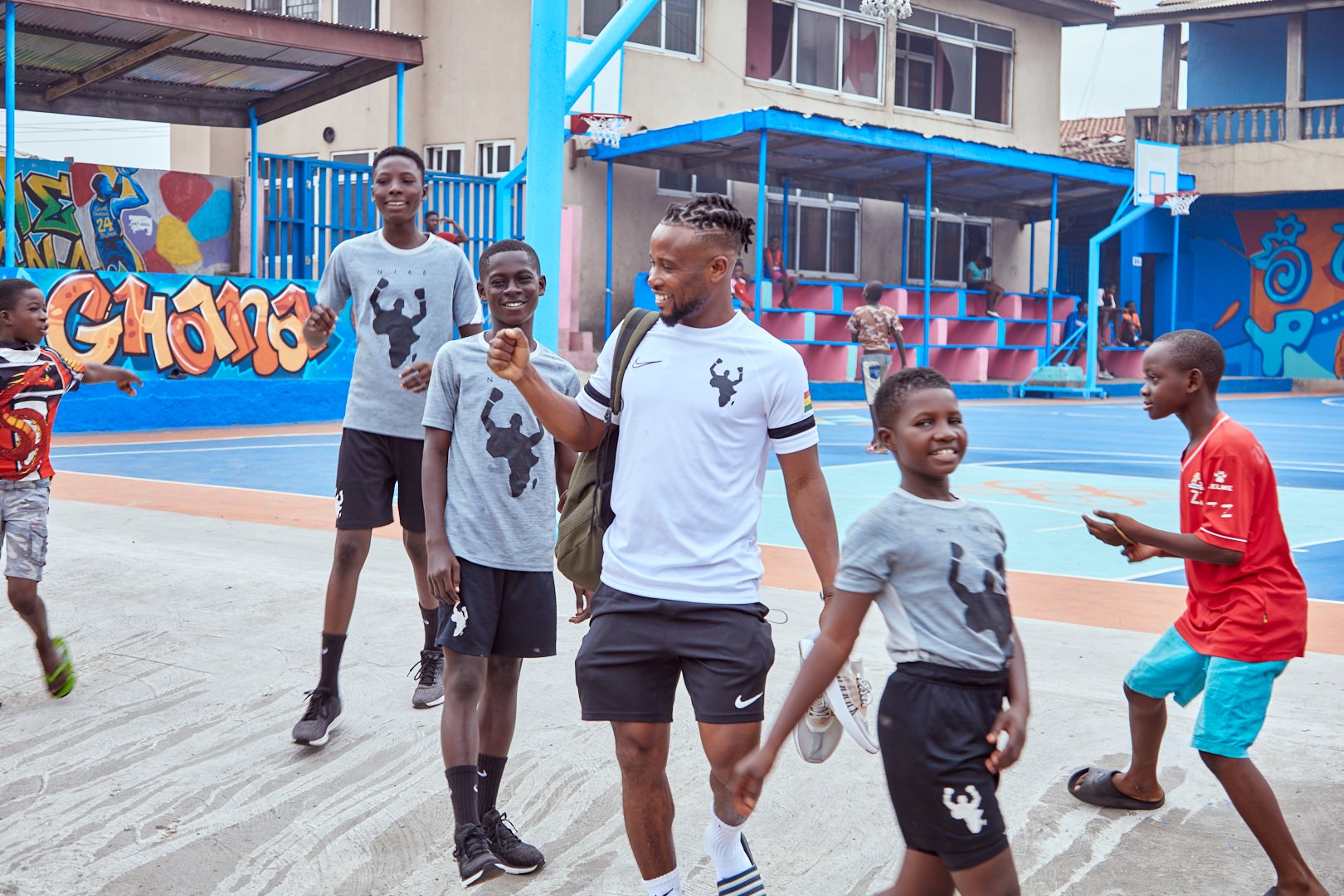
there’s no greater power for change than a community discovering what it cares about.
‘besesaka’
The name of the symbol Bese Saka from the ancient Adinkra language, translates to "Sack of cola nuts", and represents affluence, abundance and unity. Cola nuts was a major cash crop before cocoa became the main one. Used as a barter system, it also references the importance of trade as a means of community building.
OUR FOUNDER: JAMES ‘C’ NORTEY
James C Nortey
Founder and director of Besesaka
Our story starts in the streets of Bukom, a community in the coastal area of Jamestown, Accra. As a child, our founder and director, James ‘C’ Nortey was the stereotypical kid-hustler that you find in this neighbourhood. Selling anything he could get his hands on, street-boxing, dancing and playing football, ‘C’ had no idea how his life would be transformed from one day to the other. After engaging in all kinds of money-making activities, at the age of 11 years old, ‘C’ managed to work himself a chance to participate in a trial that could earn him a full scholarship to attend the Right to Dream Football Academy. His diverse talent, grit and humble character all succeeded in the trial, and faster than he could throw a jab, he found himself as part of the 2nd generation of student-athletes to join the academy.
His time at Right to Dream continued to polish his character in very challenging and humbling ways. Like many of those attending the academy ‘C’ had a dream of going pro, even though he probably was the shortest goalkeeper in the history of the game. At 15 years old, ‘C’ was told by the academy that he should think of taking the student-athlete scholarship path in the USA, where he had earned a full scholarship at the prestigious Hotchkiss School in Connecticut, where the acceptance rate is 13%. This would be a more well-rounded opportunity for him to continue developing, not only as an athlete, but also academically and as a human.
His Bukom-bred personality and talent shined through. He became the poster boy of the school, funny enough as an outfield player, broke athletic records and made friends for life. More importantly, his performance on and off the pitch earned him a full scholarship at Marquette University, where he proceeded to lead his team to win the regional conference and the NCAA’s Sweet 16. While at Marquette, on top of graduating with a degree in Social Justice, ‘C’ also engaged in numerous activities that developed his entrepreneurial and leadership traits.
After Marquette, ‘C’ decided to give professional football a shot and joined Akademisk BoldKlub in Denmark, while also working as a Character Coach for Fc Nordsjælland’s academy, Right to Dream’s professional club in Europe. After a couple of seasons of playing, ‘C’ decided to focus full-time on character development for young professionals, passing on his experience and tools onto the next generation.
Upon reflection on his journey up to this point, ‘C’ understood how important his inner fighter was in unlocking all these opportunities, and he could only think of the hundreds of kids he grew up with in the streets of Bukom. The relationship between sports and education, mixed with the Bukom spirit, changed his life forever, so his purpose became to create that same opportunity for the youth of Bukom.
This is why Besesaka was born.
OUR COMMUNITY: BUKOM
This is a place built on centuries of tribal unity and one of Ghana’s cultural hubs. We are known for our unbreakable spirit, our positive energy and our hustle.
The main tribe’, Ga’, used traditional wrestling & fighting as a conflict resolution tool many years ago. This, along with producing over 7 world champions to date, has come to identify the town as the spiritual home of boxing in Africa. Some of these champions are some of the biggest names in the history of the sport, including Azumah Nelson, Bukom Banku, Ike Quartey, Kwame Asante and Joshua Clottey.
While Bukom is famous for everything positively connected to boxing, it is also known to be one of the most underprivileged areas in Accra. There’s a real lack of structural opportunities for the town and its people to flourish the way they could. One of the main issues is the lack of quality education for youth, as it leads them to drop out and engage in activities such as street-boxing, betting and stealing. This leads to greater problems such as teenage pregnancy and youth unemployment, which have both skyrocketed over the last ten years.
Watch the full documentary here.
the numbers behind bukom’s challenges :
high school completion
9%
The national high school completion rate is 35%. Bukom however is in a category where it drops to an alarming 9%. This means 9 out of 10 children will not graduate from high school.
(UNICEF, 2020)
TEENAGE PREGNANCY
301 every day
Although we don’t have the exact figures for Bukom, at a national level this is already a major issue among young women, from as young as 10 years to 19 years old.
(Ghana Health Service, 2020)
YOUTH UNEMPLOYMENT
13.4%
Another result of our youth education crisis is that the number of youth (ages 15 - 24 years old) has tripled since 2010, reaching an all-time historic high.
(Ghana’s Population & Housing)




